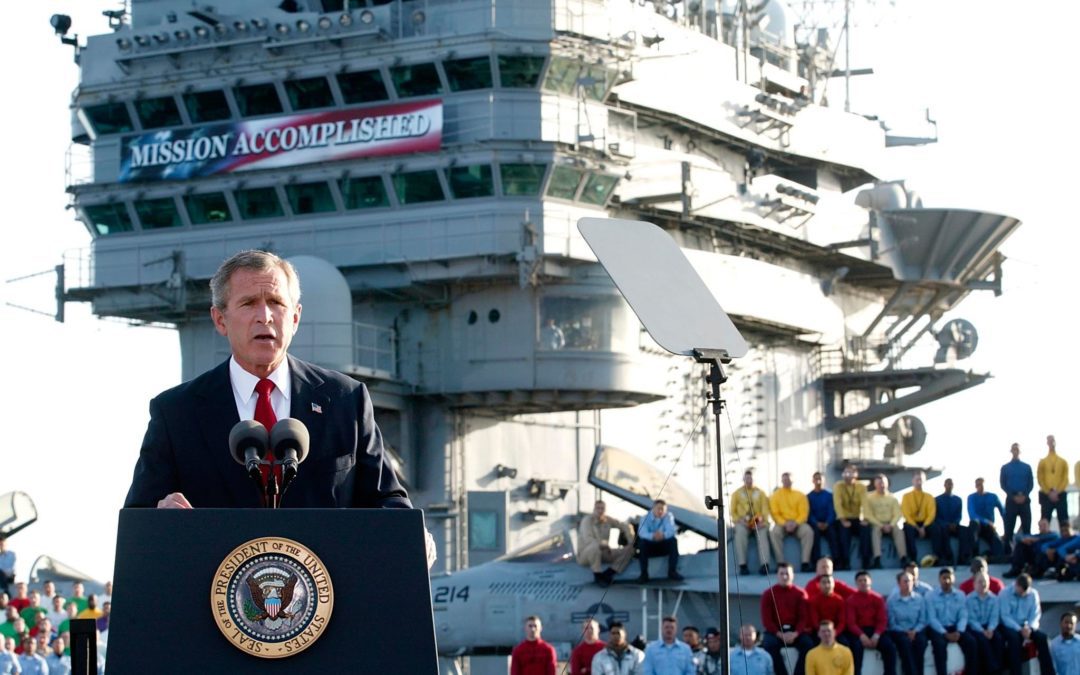The effects of U.S. power preponderance, combined with 9/11, increased the likelihood of a preventive war against Iraq.


The effects of U.S. power preponderance, combined with 9/11, increased the likelihood of a preventive war against Iraq.
In my first post after signing on with "Team Duck" I thought, before jumping into a series of weighty topics--rise of the east, end of the west, cratering of the middle east--it might be worth...
This morning, the McConnell Center at the University of Louisville hosted CIA Director David H. Petraeus. The event was not publicized and required a ticket for admission. As chair of the Political...
This week, a number of high-profile journalists and bloggers are engaged in a debate about presidential persuasion. Among other examples, they have been discussing the George W. Bush...
Does the press often serve as "government's little helper"?As you might guess, I am still thinking about the apparent failure of the public sphere (or "marketplace of ideas" if you prefer) to work properly during foreign policy crises. Many readers graciously provided interesting and helpful comments on my post from last week. Thank you! For now, however, I continue to explore the academic literature about the alleged timidity of journalists during such crises.In 1990, University of Washington scholar Lance Bennett theorized that journalists "index" the slant of their news coverage to the...
So my Spring Semester class “Rules of War” has kicked off here at Pitt. I’ve been inspired by the Duck to foreswear Blackboard and get my students blogging (pseudononymously, of course) for their online participation grade. This week’s homework: evaluate whether Lieutenant Ehren Watada’s defense at his court martial last February constituted an accurate interpretation of the international rules derived from just war theory. Facts of the matter: Lieutenant Watada joined the US Army after 9/11 but refused to deploy to Iraq with his unit because in his view, the war was illegal. He has since...
In preparation for a conference paper (warning: large pdf) due in a couple of months, I've been carefully reading a number of academic articles about the failure of the public sphere (or if you prefer, the "marketplace of ideas") to function effectively during periods of foreign policy crisis. The post-9/11 period featured limited debate about many foreign policy choices -- leading to the Iraq war, for example. Keep in mind that I'm a proponent of deliberative democracy and would like to see "the" public sphere function effectively in all political contexts. If national or global public...
Over at Foreign Policy Passport, Blake Hounshell quotes John McCreary:Several retired US military officers explained in an interview on NPR yesterday that the success of the surge is economic, not military. The US pays the 70,000-80,000 fighters better than the tribal elders and al Qaida. Al Qaida tends to pay based on piece work – per operation -- whereas the US has put the tribal youth on salary. Retired General McCaffrey is quoted as saying at $10 per day per fighter the US can pay that indefinitely.The payments began in May and the attacks declined shortly thereafter for the first time...
Wednesday, in Slate, Phillip Carter looked at what he called the first post-surge offensive by the U.S. military. Roughly 10% of American forces in Iraq are conducting operations in the the Diyala province. However, as Carter cautions, this is "an attempt to clear an area without there being a sizable number of troops available to occupy it afterward."Carter documents that this is a sizable offensive force -- bigger even than what the US employed in November 2004 during the second assault on Fallujah. Unfortunately, the size of the force will not guarantee mission success: One truism about...
We now have a lower-end estimate of civilian casualties in Iraq:An estimated 151,000 Iraqi civilians have been killed in the violence that has engulfed the country from the time of the US-led invasion until June 2006, according to the latest and largest study of deaths officially accepted by the Iraqi government.The figures come from a household survey carried out by the World Health Organisation and the Iraqi health ministry. They are substantially lower than the 601,027 death toll reported by US researchers in 2006 in the Lancet using similar study methods, but higher than the Iraq Body...
Yes, you read the title correctly. I don't think the United States should withdraw from Iraq. My disagreement with the views of some of my fellow bloggers, most of "my blog friends," and every candidate with a shot at getting my vote in the 2008 elections, stems from a number of ethical and realpolitik considerations.I feel strongly that the United States has an ethical obligation to repair Iraq--or at least to continue to try. I agree, in essence, with the so-called "Pottery Barn" rule: we broke it, we own it.[1] This is a matter of accepting moral responsibility for all the harm we've...
In January, I was skeptical about the prospects for the new Iraq strategy, commonly called "the surge." As everyone knows, the strategy was built around securing Baghdad: The Bush administration asserts that the violence in Iraq, "particularly in Baghdad," has reversed the political gains that were reflected in the 2005 elections. By stabilizing the situation in and around the capital, they assert, the U.S. can help the current government control Iraq -- and then presumably prepare to bring American troops home.Here's what I wrote about the prospects for that strategy: In my view, it means...